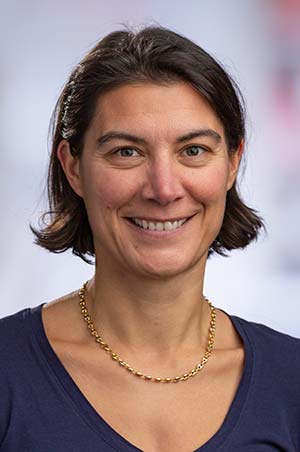Marie Pancera, PhD
Principal Staff Scientist
Vaccine and Infectious Disease Division, Fred Hutch
Research Associate
Vaccine and Infectious Disease Division, Fred Hutch
Dr. Marie Pancera studies the structure of viruses and the antibodies that the immune system uses to neutralize them. Her work informs the design of new vaccines against HIV, as well as other infectious diseases, such as SARS-CoV-2 and malaria. As a structural biologist, she is an expert in using techniques that reveal molecular structures, including X-ray crystallography and cryogenic electron microscopy. Vaccines induce the development of protective antibodies against disease, and vaccine designers’ goal is for vaccination to produce broadly neutralizing antibodies, which block multiple strains of a virus. Her studies have provided important new insights about the development of broadly neutralizing antibodies and how these antibodies bind to proteins on viruses or other infectious agents.
Other Appointments & Affiliations
Research Associate, Vaccine Research Center, National Institutes of HealthResearch Associate
Vaccine Research Center, National Institutes of Health
Education
University of Paris 7, 2005, PhD, summa cum laude (Microbiology/Virology)
École Nationale Supérieure de Chimie de Paris, 2000, MS (Chemistry/Biochemistry)
École Nationale Supérieure de Chimie de Paris, 1999, BS (Chemistry/Biochemistry)
Research Interests
Structure-based vaccine design
Structure and function of immune response against pathogens
Dr. Pancera in the News
Scientific Publications
All Dr. Pancera Publications>
Hurlburt NK, Seydoux E, Wan YH, Edara VV, Stuart AB, Feng J, Suthar MS, McGuire AT, Stamatatos L, Pancera M. "Structural basis for potent neutralization of SARS-CoV-2 and role of antibody affinity maturation." Nat Commun. 2020 Oct 27;11(1):5413. doi: 10.1038/s41467-020-19231-9.PMID: 33110068
Borst AJ, Weidle CE, Gray MD, Frenz B, Snijder J, Joyce MG, Georgiev IS, Stewart-Jones GB, Kwong PD, McGuire AT, DiMaio F, Stamatatos L, Pancera M, Veesler D. "Germline VRC01 antibody recognition of a modified clade C HIV-1 envelope trimer and a glycosylated HIV-1 gp120 core." Elife. 2018 Nov 7;7. doi: 10.7554/eLife.37688. PubMed PMID: 30403372; PubMed Central PMCID: PMC6237438.
Kisalu NK, Idris AH, Weidle C, Flores-Garcia Y, Flynn BJ, Sack BK, Murphy S, Schön A, Freire E, Francica JR, Miller AB, Gregory J, March S, Liao HX, Haynes BF, Wiehe K, Trama AM, Saunders KO, Gladden MA, Monroe A, Bonsignori M, Kanekiyo M, Wheatley AK, McDermott AB, Farney SK, Chuang GY, Zhang B, Kc N, Chakravarty S, Kwong PD, Sinnis P, Bhatia SN, Kappe SHI, Sim BKL, Hoffman SL, Zavala F, Pancera M, Seder RA. "A human monoclonal antibody prevents malaria infection by targeting a new site of vulnerability on the parasite." Nat Med. 2018 May;24(4):408-416. doi: 10.1038/nm.4512. Epub 2018 Mar 19. PubMed PMID: 29554083; PubMed Central PMCID: PMC5893371.
Pancera M, Zhou T, Druz A, Georgiev IS, Soto C, Gorman J, Huang J, Acharya P, Chuang GY, Ofek G, Stewart-Jones GB, Stuckey J, Bailer RT, Joyce MG, Louder MK, Tumba N, Yang Y, Zhang B, Cohen MS, Haynes BF, Mascola JR, Morris L, Munro JB, Blanchard SC, Mothes W, Connors M, Kwong PD. "Structure and immune recognition of trimeric pre-fusion HIV-1 Env." Nature. 2014 Oct 23;514(7523):455-61. doi: 10.1038/nature13808. Epub 2014 Oct 8. PubMed PMID: 25296255; PubMed Central PMCID: PMC4348022.
